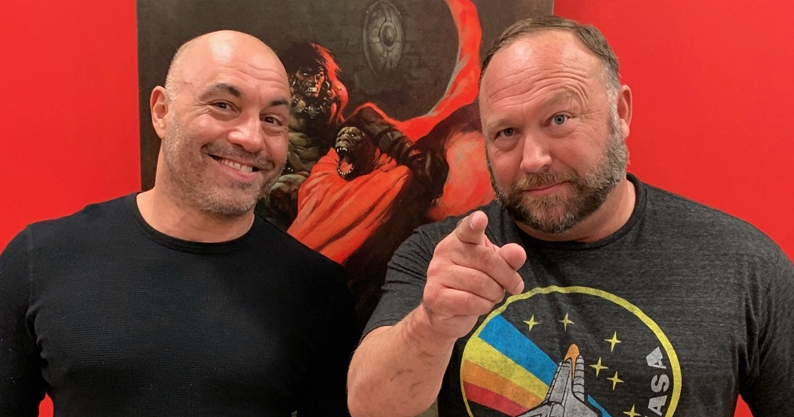https://twitter.com/MikhailaAleksis/status/1300713380982984705?ref_src=twsrc%5Etfw
Down the memory hole they go!
Joe Rogan made his Spotify debut on Tuesday, but apparently not all of his podcast episodes made the cut.
Dozens of past episodes with controversial guests are notably absent from the new Joe Rogan Experience channel, such as interviews with conspiracy theorists Alex Jones and David Seaman, far-right figures such as Owen Benjamin, Stefan Molyneux, Milo Yiannopoulos, Gavin McInnes, Charles C. Johnson, and Sargon of Akkad, as well as comedian Chris D’Elia (who has recently been accused of sexual impropriety). Also seemingly absent is an early episode where Rogan regular Joey Diaz infamously joked about coercing female comics into performing oral sex — an exchange that resurfaced in the press in the wake of the Spotify deal. A few of the vanished episodes were more perplexing, however, such as an interview with pot activist Tommy Chong.
…
Spotify reportedly paid more than $100 million to lure the country’s most popular podcaster exclusively to the streaming service. The Spotify-based shows launched with a marathon five-hour interview with comedian Duncan Trussell, but the missing episodes were not addressed. Rogan’s shows are still currently available on YouTube and podcasting platforms like iTunes, but the plan is for JRE to move exclusively to Spotify by the end of the year. The partnership was considered a massive win for Spotify, which has seen its stock price nearly double since the deal was announced.
Rogan’s podcast includes more than 1,500 episodes of long-form interviews with comedians, actors, sports figures, authors, intellectuals, and political commentators. The comedian and MMA commentator has long prided himself on talking to people from across the political spectrum and has frequently railed against “de-platforming” — tech companies that remove controversial voices.
“They want me to just continue doing it the way I’m doing it right now,” Rogan has previously said of the Spotify deal. “It’s just a licensing deal, so Spotify won’t have any creative control over the show. It will be the exact same show. We’re going to be working with the same crew doing the exact same show.”
In a profile of Rogan in The Atlantic last August, writer Devin Gordon detailed Rogan’s many strengths as a podcaster, yet also cited some of his guest choices as a serious blindspot: “Joe likes [Jack Dorsey]. He likes Milo Yiannopoulos. He likes Alex Jones. He wants you to know that he doesn’t agree with much of what they say, but he also wants you to know that off camera they’re the nicest guys. If we all have fatal flaws, this is Joe’s: his insistence on seeing value in people even when he shouldn’t, even when they’ve forfeited any right to it, even when the harm outweighs the good. It comes from a generous place, but it amounts to careless cruelty. He just won’t write people off, and then he compounds the sin by throwing them a lifeline at the moment when they least deserve it.”
Now it seems in Rogan’s move to Spotify that a handful of his most radioactive guests may have at last been written off — or, at least, off his new platform.
What this means is that these shows will not be available to anyone ever again, except through illegal methods such as a torrent site. They will be effectively erased from human consciousness. It will be as though the events never happened.
This is yet another thing we learned about from George Orwell’s book 1984: that’s where the term “memory hole” came from.
A memory hole is any mechanism for the deliberate alteration or disappearance of inconvenient or embarrassing documents, photographs, transcripts or other records, such as from a website or other archive, particularly as part of an attempt to give the impression that something never happened. The concept was first popularized by George Orwell’s 1949 dystopian novel Nineteen Eighty-Four, where the Party’s Ministry of Truth systematically re-created all potentially embarrassing historical documents, in effect, re-writing all of history to match the often-changing state propaganda. These changes were complete and undetectable.
Again, however, we are in a situation much worse than Orwell ever could have imagined possible.
The fact that these records are digital means that it is completely doable to simply wipe them out.
We’ve noted that the digital records of 1990s and early 2000s rap songs are being edited to remove the word “faggot” by YouTube and iTunes, which is in line with what is going on with the burying of Rogan’s unsightly guests by Spotify.
These mega corporations that control the digital world are in the business of regulating total social morality, and they are currently in the process of erasing not only history, but very recent history. They are currently developing a situation where the narrative will be edited in real time. The heel turn that the Democrats just made, moving from claiming that BLM/Antifa riots didn’t exist to claiming that they are run by Donald Trump, is a foreshadowing of what is to come.
Make sure to keep your own records of things you think should be kept for future generations. A couple of external hard drives loaded up with banned materials could very well become important historical documents some day.

